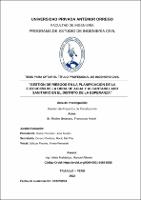Gestión de riesgos en la planificación de la ejecución de la obra de agua y alcantarillado sanitario en el Distrito de la Esperanza

View/
Download
(application/pdf: 57.58Kb)
(application/pdf: 57.58Kb)
Date
2022Author(s)
Robles Bejarano, Francesco André
Metadata
Show full item recordAbstract
Los proyectos de construcción promovidas y financiadas por el Estado
Peruano, se ejecutan bajo una incertidumbre considerable, debido a que es muy
difícil controlar algunas variables internas y externas, que afectan el desempeño de
los proyectos en términos de tiempo, costo, calidad y eficacia. Actualmente muchos
proyectos no se llevan a cabo exitosamente dentro del costo y plazo
contractual. Para mantener esta situación, es necesario adoptar un método que
ayude a aumentar la posibilidad de hacer que los proyectos de construcción sean
más exitosos.
El presente estudio de investigación gestión de riesgos en la planificación de
la ejecución de la obra de agua y alcantarillado sanitario en el distrito de La
Esperanza, tiene como objetivo, determinar porque la utilización de técnicas y
herramientas, basado en la metodología PMBOK / PMI y los formatos, índices y
escalas establecidos en la DIRECTIVA N° 012-2017-OSCE/CD influyen en la
eficiencia y utilidad tanto de la Entidad como de la empresa contratista;
desarrollando tres fases: recolección de datos, análisis de los datos y elaboración
del reporte de los resultados.
En la etapa de recolección de datos, se solicitará a la Municipalidad Distrital
de La Esperanza, una copia del expediente técnico en versión digital del caso de
estudio “Instalación del Sistema de Agua Potable y Alcantarillado Sanitario en
Sectores Virgen del Socorro, Víctor Raúl, Sol Naciente y Aledaños – Distrito de La
Esperanza y Huanchaco – Trujillo – La Libertad”, así como documentación
complementaria para desarrollar el presente trabajo de investigación; asimismo, se
utilizarán cuaderno de notas, cuestionarios, fichas de observación y cámara
fotográfica.
En la etapa de análisis de datos, se examinará cada uno de los procesos de
los riesgos identificados, en el plan de gestión de riesgos del expediente técnico del
caso de estudio, si han cumplido con los procedimientos establecidos en la
Directiva N° 012-2017/OSCE-CD y su comparación con las buenas prácticas del
PMI, de la guía del PMBOK - sexta edición. En esta etapa se desarrollarán cuatro
procesos: identificar riesgos, analizar riesgos, planificar la respuesta a riesgos y
asignar riesgos The construction projects promoted and financed by the Peruvian State are
carried out under considerable uncertainty, since it is very difficult to control some
internal and external variables that affect the performance of the projects in terms
of time, cost, quality and efficiency. Currently many projects are not successfully
carried out within the cost and contractual term. To maintain this situation, it is
necessary to adopt a method that helps increase the possibility of making
construction projects more successful.
The objective of this research study is risk management in the planning of the
execution of the water and sanitary sewer work in the district of La Esperanza, to
determine why the use of techniques and tools, based on the PMBOK / PMI
methodology and the formats, indices and scales established in DIRECTIVE No.
012-2017-OSCE/CD influence the efficiency and usefulness of both the Entity and
the contractor company; developing three phases: data collection, data analysis and
preparation of the results report.
In the data collection stage, a copy of the technical file in digital version of the
case study ““Installation of the Potable Water and Sanitary Sewerage System in
Sectors Virgen del Socorro, Víctor Raúl, Sol““ will be requested from the District
Municipality of La Esperanza. Naciente y Aledaños – District of La Esperanza and
Huanchaco – Trujillo – La Libertad”, as well as complementary documentation to
develop this research work; Likewise, notebooks, questionnaires, observation
sheets and a photographic camera will be used.
In the data analysis stage, each of the identified risk processes will be
examined, in the risk management plan of the technical file of the case study, if they
have complied with the procedures established in Directive No. 012-2017 /OSCE CD and its comparison with the good practices of the PMI, from the PMBOK guide
- sixth edition. In this stage, four processes will be developed: identify risks, analyze
risks, plan the response to risks and assign risks.
With the results obtained in the Risk Management Plan of the project under
study, an improvement to the risk management methodology is proposed in the
execution phase of the work.
From the evaluation carried out, it was determined that the consulting team
that prepared the technical file has not complied with developing the risks
ix
established in numeral 7.2 of Directive No. 012-2017-OSCE/CD, for which it is
proposed, in addition to compliance with the Directive, apply a Risk Management
Process, which contains as input elements all the historical and technical
information and studies carried out
Collections
- Ingeniería Civil [1260]

